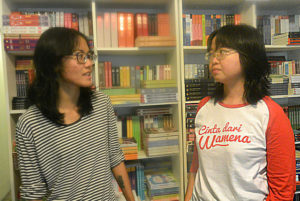Although Thailand basically tolerates same-sex couples, the more deeply conservative Rural Thai in the northeastern region of the country consider lesbian, gay, bisexual, transgendered, and intersexed people to be abnormal. According to an article in the Bangkok Post last week, couples within the LGBTI community are having a lot of problems, especially with their desires to raise children.
Matcha Pornin, for instance, who is from northeastern Thailand, offered to raise the daughter of her younger brother. He was having a hard time supporting the child but he was hostile to the idea because his sister had a girlfriend. He felt she was not good enough to be a parent, she complained. Ultimately, he gave in to Matcha, but only because his finances forced him to.
Matcha lists some changes that need to take place in Thailand that will prompt it to become more open-minded. Laws should be passed to allow same-sex marriages and partners to have families. The society needs to understand the LGBTI community better. In order to achieve those aims, the LGBTI people need to explain themselves more effectively, she says.

The newspaper argues that while tolerance for same sex couples is relatively high in Thailand, that toleration does not extend to their raising children. LGBTI parents normally are not legally allowed to become parents. Anticha Sangchai, for instance, has custody of her daughter from a previous marriage, but her partner, Daranee Thongsiri, does not have any share in that custody. “In terms of society’s traditional family values, heterosexual parents are believed to be superior,” Anticha complains.
She goes on to argue that same sex couples have always existed, but she decries the biases of her society in favor of traditional gender relationships. “Anything that is different from the norms will be excluded and rejected,” she adds. And what really distresses her is that Thai children are being brought up with the same values.
The Bangkok Post interviewed Rosalyn Payne, a British citizen, and her Thai wife Arty. They have twin daughters through in-vitro fertilization, but Arty couldn’t also become a legal parent in Thailand since Thai law prohibits same-sex marriages. Even though Arty’s family love the twins and wanted to be part of their lives, the relationship was a hassle because her role as a parent could not be acknowledged legally. The couple finally went to the British embassy in Vietnam to legitimize both women as their legal guardians.
Then they moved to Prague, in the Czech Republic. Payne told the paper that in Europe they have found that they have equal rights for the children. The problem in Thailand, she suggests, is that people generally leave difficult things unsaid.
Matcha Pornin, the woman from conservative rural northeastern Thailand who adopted her brother’s daughter, told the paper that after four to five years of raising the child, the family’s attitudes have been softening. She and her partner have proven to the others that they are quite capable of being good parents, “and the homophobia in my family has lessened. Things are getting better.”